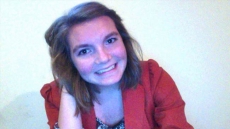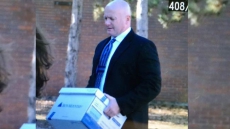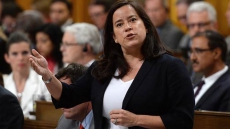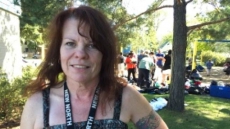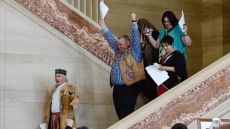OTTAWA — Canada's border agency is pulling the plug on the controversial reality TV program "Border Security" after the federal privacy commissioner found the agency violated the rights of a construction worker filmed during a raid in Vancouver.
Privacy commissioner Daniel Therrien recently informed the British Columbia Civil Liberties Association, which spearheaded a complaint on behalf of Oscar Mata Duran, that the Canada Border Services Agency breached the Privacy Act by allowing production company Force Four to film the agency's examination of the migrant labourer.
"As a matter of principle, it is our view that federal government institutions cannot contract out of their obligations under the Act," says the commissioner's 26-page report of findings.
In light of the well-founded complaint, Therrien's office recommended the border agency end its participation in the television program, which the agency agreed to do.
Agency spokeswoman Esme Bailey confirmed that "Border Security: Canada's Front Line" would not return for a fourth season.
The commissioner also urged the agency to carry out a formal privacy impact assessment before embarking on any significant future initiative involving the use of personal information.
"Border Security" began airing on the National Geographic Channel in 2012, chronicling encounters between border officers and the public. The unscripted series was seen by millions of Canadians and has aired in dozens of other countries.
The border agency saw the show as a means of informing Canadians and international audiences about its activities.
Opponents who considered the program crass and exploitative had long pushed for its demise.
The show amounted to a "reckless public-relations stunt," said Laura Track, counsel for the civil liberties association.

The association hopes the privacy ruling sounds the death-knell for similar reality TV shows featuring law-enforcement agencies, she said in an interview. "Filming people in such vulnerable situations is dehumanizing, and showing it as for-profit entertainment is despicable. And what the privacy commissioner decided this week is that it's also illegal."
The border agency told the commissioner the TV program was strictly based on voluntary participation, adding the show would not identify anyone who had not directly agreed to participate.
During the agency raid of March 13, 2013, Mata Duran hid inside a building on the construction site but he was found and questioned by an officer about his identity, immigration status and employment. The Mexican man was later brought to an immigration detention facility, where he says he was presented with a consent form that he did not read but signed out of confusion and fear.
Upon viewing the raw footage taken by the film crew, the privacy commissioner's office concluded the entire interaction between the border officer and Mata Duran was captured on video before he was advised of the purpose of the filming, let alone asked for his permission.
Ultimately, the commissioner was not satisfied that the border agency obtained Mata Duran's "valid consent" for the filming.
In general, the office concluded that due to the "coercive nature" of being detained by the border agency, those held "may not have a clear frame of mind to provide truly voluntary consent."
Mata Duran's case raises the overarching question of whether "there is a public interest to be served by a government institution televising its operational activities," the commissioner's report adds.
After the raid, Mata Duran was deported to Mexico, where he remains.

Track lauded him as "a real hero" for lodging the privacy complaint when there was no prospect of personal gain, other than an acknowledgment "that what happened to him was wrong."
